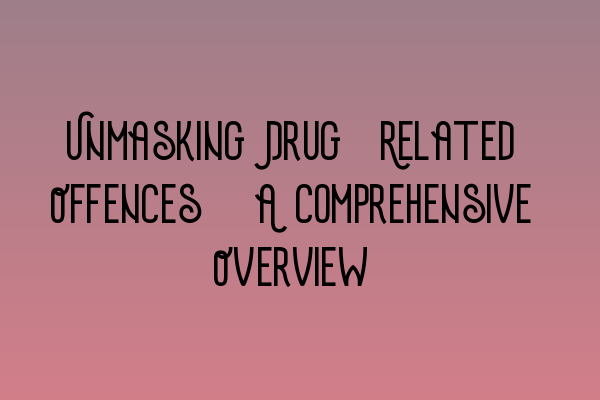Unmasking Drug-Related Offences: A Comprehensive Overview
Drug-related offences are a serious concern in today’s society. Understanding the laws and regulations surrounding drug offences is crucial for legal practitioners and individuals involved in the criminal justice system. In this comprehensive overview, we will delve into the various aspects of drug-related offences, including their classifications, penalties, and potential defences.
Classification of Drug Offences
Drug offences can be broadly categorized into two major types: possession offences and trafficking offences.
1. Possession Offences:
Possession of controlled substances without a lawful justification is a criminal offence. The severity of the offence generally depends on the classification of the drug involved. Class A drugs, such as heroin and cocaine, carry more severe penalties compared to Class B and Class C drugs.
2. Trafficking Offences:
Trafficking or supplying controlled substances involves the sale, distribution, or transportation of drugs. The penalties for trafficking offences are typically harsher than possession offences due to the potential harm caused to individuals and communities.
Understanding the specific elements and elements of each offence is crucial in building an effective defence strategy for individuals accused of drug-related offences.
Penalties for Drug Offences
The penalties for drug-related offences vary depending on several factors, including the seriousness of the offence, the type of drug involved, and the individual’s criminal history. Common penalties include:
– Imprisonment
– Fines
– Confiscation of assets obtained through drug-related activities
– Community service
– Rehabilitation programs
A seasoned solicitor can provide valuable assistance in navigating the legal system and advocating for a fair outcome for their clients.
Defences for Drug-Related Offences
Effective defences for drug-related offences require a thorough understanding of the law and careful examination of the circumstances surrounding the case. Some potential defences include:
– Lack of knowledge or control of the substance
– Invalid search or seizure
– Entrapment
– Mistaken identity
– Duress or necessity
– Insufficient evidence
It is essential to consult with a knowledgeable solicitor to assess the viability of these defences and develop a strong legal strategy.
Conclusion
Drug-related offences are serious crimes with severe consequences. This comprehensive overview has provided a glimpse into the classifications, penalties, and potential defences for drug offences. If you require legal assistance or want to learn more about related topics, feel free to explore our website and check out our helpful articles such as:
– SQE 1 Practice Exam Questions
– SQE 1 Practice Mocks FLK1 FLK2
Our team at SQE Criminal Law & Practice Law UK is here to provide expert legal advice and support. Contact us today to discuss your case and ensure the best possible outcome.
